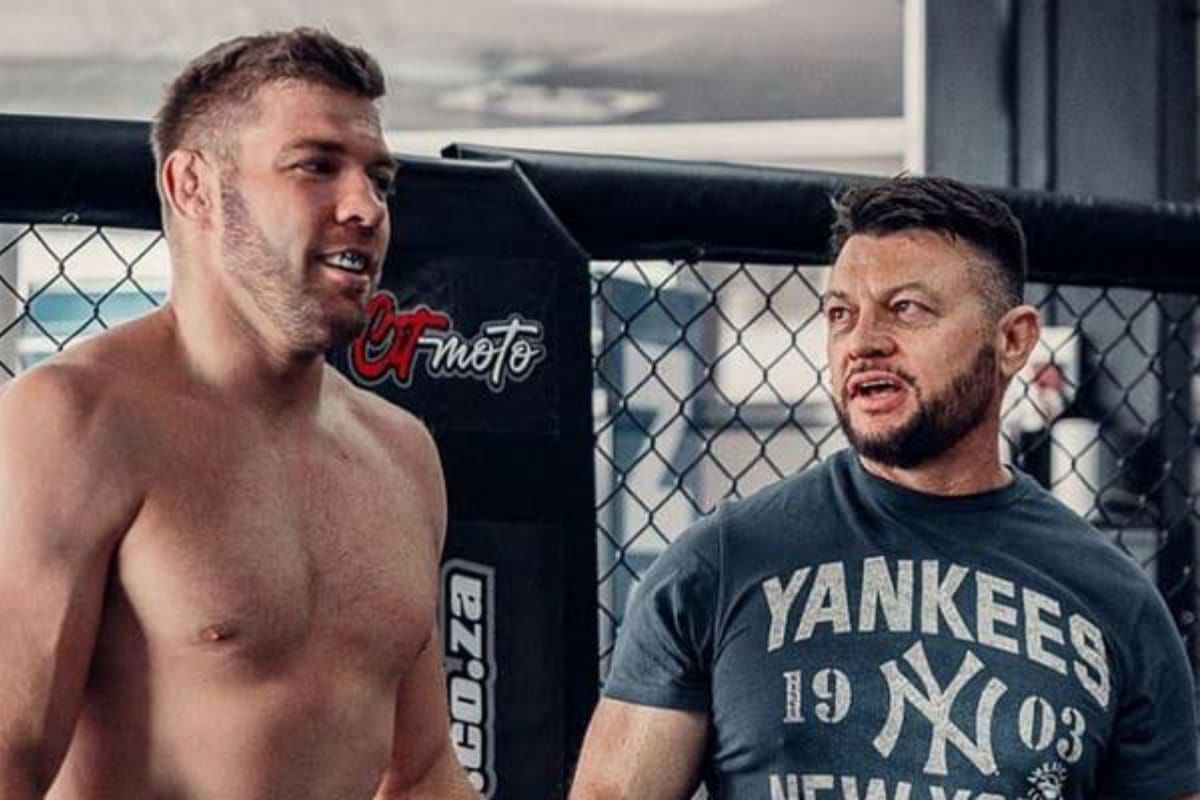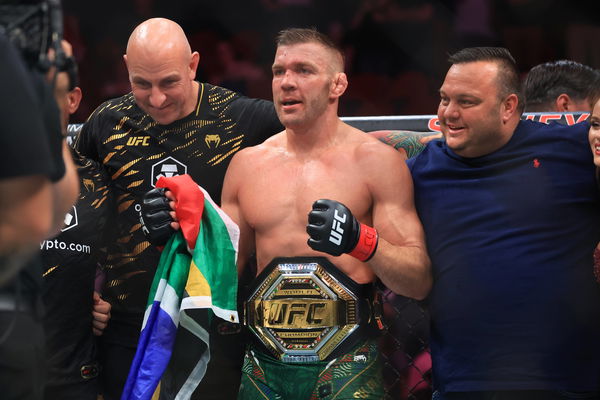

In a UFC roster stacked with specialists and elite talent, middleweight kingpin Dricus Du Plessis has carved out a niche with his unorthodox and unpredictable style. Analysts often describe that unpredictability as deliberate: Du Plessis trains to be rhythm-free to frustrate timing and prediction, which is why opponents who rely on reading patterns have struggled against him. Often described as a “chimpanzee-like” or dancing style, his seemingly erratic approach conceals lethal precision — combining powerful strikes, slick footwork, and relentless grappling that let the South African finish opponents with his signature awkward-looking but highly effective style.
Watch What’s Trending Now!
Du Plessis’ unconventional methods have delivered results. He has claimed victories over elite fighters like Israel Adesanya and Sean Strickland (he defeated Strickland twice — including a title defence at UFC 312 in Sydney). His win over Adesanya at UFC 305 came by rear-naked choke in Round 4, a finish that immediately elevated his standing in the division. Earning recognition from peers including Jiří Procházka, who observed, “No technic, no rhythm but 200% activity and pressure.”
ADVERTISEMENT
Now, ‘Stillknocks’ readies for his third title defense against the undefeated Khamzat Chimaev at UFC 319. Despite Chimaev’s feared skill set, Dricus Du Plessis’ unpredictable game plan continues to baffle opponents, a testament to his coach, Morne Visser. Chimaev enters as the bookmakers’ favorite, yet Du Plessis has thrived as the underdog before, most notably when experts predicted Adesanya’s championship experience would overwhelm him. This psychological edge has been a talking point among fight analysts, who believe Du Plessis relishes the role of spoiler.
ADVERTISEMENT
Georges St-Pierre’s coach applauds Dricus Du Plessis’ coach ahead of big fight
At CIT Performance Institute, Visser drives fighters with a no-nonsense approach, employing tough love and sharp corrections when athletes stumble in their training. Some folks are singing its praises as a stroke of genius, while others are calling it over the top, nearly like something out of a blockbuster film. MMA legend Georges St-Pierre’s coach, Firas Zahabi, praised Visser on YouTube, saying, “I like one thing about DDP’s coach — the way he tases DDP when DDP makes errors. You know, you can’t really do that kind of stuff anymore.”
Reflecting on his own experiences under BJJ legend John Danaher and Muay Thai master Peter, Zahabi added, “When we used to train, my trainer would hit us with a stick. Not John Danaher — black belt John Danaher — he was also very harsh in the practice room. But Master Peter, my Muay Thai trainer, was very harsh, very heavy-handed. If you dropped your hands in sparring or made an error, he would club you with his hand — open hand — or hit you with a stick. He would walk around with a Cali stick.”
ADVERTISEMENT
This is Zahabi recounting old school practices in context, it’s not an endorsement of tasing and should not be conflated with a quote praising Visser’s specific methods.

Imago
UFC 312 SYDNEY, Dricus Du Plessis of South Africa retains his middleweight title against Sean Strickland of United States during the UFC 312 event at Qudos Bank Arena in Sydney, Sunday, February 9, 2025. ACHTUNG: NUR REDAKTIONELLE NUTZUNG, KEINE ARCHIVIERUNG UND KEINE BUCHNUTZUNG SYDNEY NEW SOUTH WALES AUSTRALIA PUBLICATIONxNOTxINxAUSxNZLxPNGxFIJxVANxSOLxTGA Copyright: xMARKxEVANSx 20250209179384047954
While such traditional methods proved effective, modern regulations, especially in the U.S., no longer allow physical punishment in training. Yet, in Russia, some MMA schools still embrace these old-school techniques. A stark example comes from Khabib Nurmagomedov’s academy in Dagestan, where students faced sticks for being late or for sporting short hair.
ADVERTISEMENT
This rigid discipline, rooted in the strict rules enforced by Khabib’s late father, reportedly pushed middleweight phenom Shara Magomedov to leave the Nurmagomedov school, unwilling to comply with the hair-cut requirement.
ADVERTISEMENT
Dricus Du Plessis defends coach’s tough training methods
Dricus Du Plessis stepped onto the UFC stage for his second appearance in 2021 during the historic UFC 264: Poirier vs. McGregor trilogy prelims. Over the next four years, he has transformed into a formidable force in the middleweight division. Relying not just on technical precision but on raw power and relentless aggression, he has toppled every opponent in his path, including elite fighters like Israel Adesanya, whose dominance in the sport often draws comparisons to Anderson Silva.
ADVERTISEMENT
Much of this evolution comes from his coach, Morne Visser, who pushes his fighters relentlessly to their limits. ‘Stillknocks’ has shared that after grueling two-hour training sessions, Visser would line up other students and challenge them to take him down for $10,000 — a serious test, not a stunt. This reflects Visser’s tough, old-school coaching style, blending high-pressure challenges with psychological teasing, all designed to build mental and physical resilience. Dricus Du Plessis has always embraced these trials.
Speaking recently to Chicago Sports Network, Dricus Du Plessis highlighted the value of hard training. He said, “Let me tell you this. They did that willingly. I don’t get tased willingly. So, that just does change the odds. My coach uses the taser because what are you going to do with us? You know we’re not kids, we’re fighters, so hard-headed and sometimes we need a little bit of extra motivation to get these things right because we are set in our ways, bad habits or habits.”
What’s your take on Coach Visser’s tough-love approach with his fighters? Do you reckon that this kind of discipline stems more from the fear of getting in hot water, or is it something that grows from the fighter’s own inner fire? Meanwhile, the rise of Russian and Brazilian fighters in MMA underscores that mental toughness and the right mindset are key players in the big leagues.
ADVERTISEMENT
ADVERTISEMENT
ADVERTISEMENT
ADVERTISEMENT